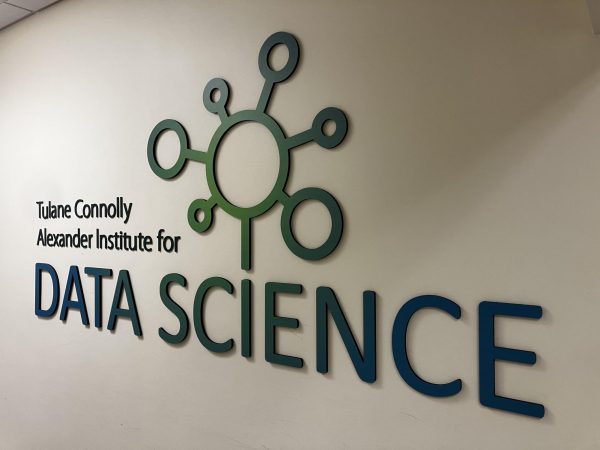
Data is a crucial part of making decisions every day. However, the use and presentation of data can be misconstrued to influence certain ideas, so data literacy in this day and age is essential.
Plans of new data curriculum, co-curricular experiences and research engagement are currently underway to cultivate data literacy in students and acquire the advanced skills to critically observe, interpret data and make informed decisions appropriately.
To support the growing need for data literacy, The Connolly Alexander Institute for Data Science was founded to “equip the members of the Tulane University community with the ability to read, work with, analyze and communicate about data” and to promote inclusivity, accessibility, sustaining social responsibility, building community and promoting innovation.
CAIDS has since made several initiatives to increase data literacy, including launching several data courses, workshops, programs and student research opportunities.
Courses
The institute started offering courses to students in the fall of 2023. Current courses include: Introduction to Data, Data Visualization, Text and Qualitative Data Analysis, Artificial Intelligence Tools and Introduction to Artificial Intelligence.
These courses are designed to build a strong understanding of data that will be useful in every career path.
“Other courses we’re planning to offer are Introduction to Data Collection and Wrangling, Introduction to Causal Inference and GIS & Mapping Global Issues,” Patrick Button, the executive director of CAIDS, said. To incentivize enrollment in data courses, some future courses will fulfill other core requirements.
Data science is an interdisciplinary field, so CAIDS collaborates with different departments to help instructors incorporate data in their curriculum “to support the larger set of courses across the entire university,” Button said.
The institute is working on creating a data major, minor and certificate.
Workshops
CAIDS faculty and staff host workshops for Tulane faculty and students to engage with data visualization tools and promote data literacy. These workshops will allow educators to effectively implement data in their course instruction. These workshops present students with an opportunity to refine their data analysis skills.
Knud Berthelsen, professor of practice at CAIDS, hosts workshops on artificial intelligence, demonstrating how to use the latest versions of ChatGPT, Gemini and Meta AI.
Lisa Dilks, professor of practice and associate director of curriculum and assessment at CAIDS, will lead workshops on data visualization software like Microsoft Excel.
The Center for Community-Engaged Artificial Intelligence, the Center for Engaged Learning and Teaching and the Innovative Learning Center are other collaborators that offer data workshops and film screenings.
“There’s a lot that we need to learn and a lot of different audiences… so it’s been great to be able to collaborate, to try to help equip people with these tools,” Button said.
The Data Lab student programs
The Data Lab, directed by Jacquelyne Howard and managed by Ifeoma Osakwe, runs three student programs: the Data Peer Mentor Program, the Data Ambassador Council and the Data Research Internship Program. The Data Lab aims to build a supportive community, apply data equity, make data literacy skills accessible and cultivate students to “become users, researchers, makers and critics of data knowledge.”
Sophomore Katie Bogdanow, a CAIDS data research intern, works with nonprofits and partners in the New Orleans community to build their websites and create data visualizations.
“Instead of talking about data, I’m actually doing it and seeing progress being made,” Bogdanow said.
Bogdanow described how her experience with CAIDS has impacted her perspective on the necessity of data literacy skills for students.
“Once I started working with the Data Institute, I realized how much Tulane students could benefit from it,” Bogdanow said. “In my required lab course, we were making scatterplots in Excel, and I was the only one who knew how to do it.”
Research
CAIDS provides undergraduate and graduate student research grants to support data-intensive research projects.
For undergraduate students, CAIDS partners with the Newcomb-Tulane College Office of Academic Enrichment to provide academic enrichment grants for data projects geared towards student research that focuses on data literacy, data analysis or data management. CAIDS additionally provides summer grants that support graduate student research.
Students have the opportunity to present their research incorporating some sort of data skills.
“Every year, we have a showcase where students show off the work that they’ve been doing in the lab or other sort of research projects,” Button said. “Seeing what people have worked on is fascinating, especially being able to tie their data skills to something that’s important to them or their community.”
Another aspect of CAIDS research is the Discrimination, Disparities, and Data Lab, also known as D3L. D3L is a team of faculty, postdoctoral scholars and students that conducts data-driven research by documenting and understanding the discrimination and socio-economic disparities that minoritized groups face. The lab promotes data research opportunities for students to identify how discrimination and disparities occur. After making inferences, the lab will construct proposals that significantly “reduce disparities and dismantle discriminatory barriers.”


